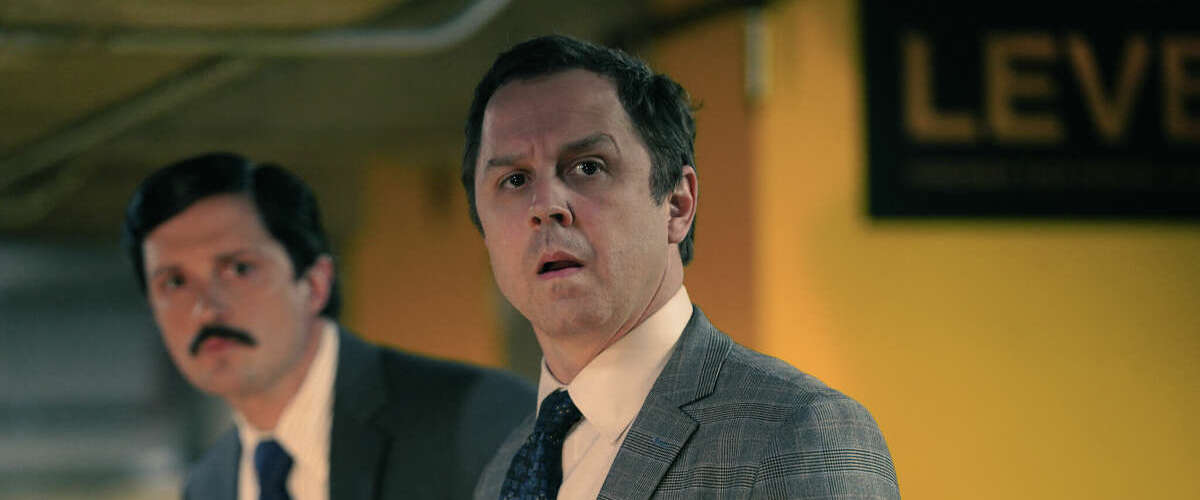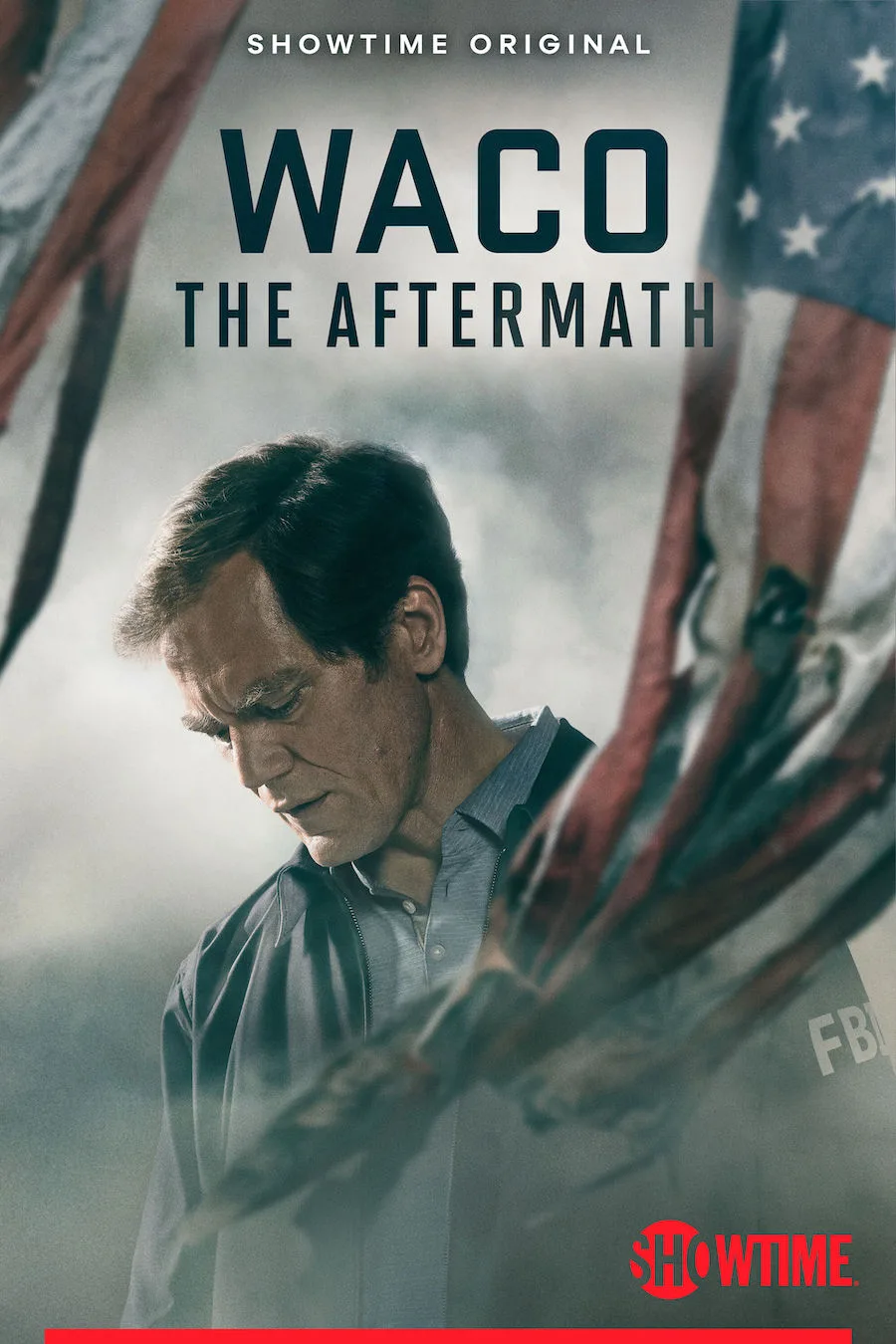“We don’t want another Waco.” After the harrowing events on April 19, 1993, everyone knew what that statement meant, and the fear behind it. But as harrowing as Waco was, it was more of the beginning of other problems related to the government and private citizen’s rights. “Waco: The Aftermath” traces these issues with its many subplots and characters, sometimes in service of showing the nuance needed in this story, and other times just because we love the dramatization of any true crime. This series is a continuation from Showtime’s 2018 series “Waco,” using flashback footage to that series’ dramatization of the siege. “Waco: The Aftermath” arrives not only near the 30th anniversary of the events, but as we deal with the own aftermath of January 6, 2021. This is also a story about self-proclaimed patriots and their threat of violence, and is arguably even more pertinent than it was five years ago. We don’t want another insurrection.
Created by series directors Drew Dowdle and John Erick Dowdle (“No Escape,” “As Above, So Below”), “Waco: The Aftermath” wants to provide audiences with more juicy history of all things Waco while being aware that nothing can match the intensity of its previously dramatized siege. And so “Waco: The Aftermath” fires everything at its audience, giving us a drawn-out prequel, a courtroom-drama sequel, and a tedious spin-off all at once, packed with characters and subplots and slow burns. Blink, and you’ll miss an appearance from John Leguizamo as undercover ATF agent Vasquez from the original series. However, he’s still given a guest title card in the show’s moody, flame-filled opening credits (also including Gary Cole, Shea Whigham, and J. Smith-Cameron).
The biggest chunk of “Waco: The Aftermath” involves a chapter not often talked about, that of the surviving Branch Davidians who were put on trial for conspiracy against the government. From a dramatic standpoint, it’s the potent microcosm this story needs—putting freedoms on trial and putting the term’s parameters under a hot spotlight. In its best moments, “Waco: The Aftermath” humanizes the people the media wrote off as simply being in a cult while overlooking their free will to be in Koresh’s community and later defending it. Five of them are put on trial in front of a judge who already seems to have his mind made up, hinting at the sentiment everyone experienced after Waco, especially those in some government-related power.
But the former followers of leader David Koresh have a tenacious support in the form of lawyer Dan Cogdell played by Giovanni Ribisi, with weary eyes, quick wit, and a gravely voice. In the series’ sporadically exciting courtroom drama, Dan goes up against the prosecuting government to prove that it was the ATF, and not the Branch Davidians who shot first when everything first got violent. The Branch Davidians were just defending themselves from aggressive policing. Nor were they brainwashed, despite the outsider’s perspective painting their experience that way. This arc is treated with some cleverness and rewarding little victories for the underdogs—like any courtroom drama, it has surprise developments that spike its more exposition-heavy moments. But these scenes of Cogdell either working with his clients in a side room or standing up for them in a courtroom are sometimes blocked and shot with revealing indifference by the Dowdles, leaving their symbolic freedom fighters stranded in a space without enough dramatic momentum.
This recounting of the Branch Davidians’ stories also makes for sandy-tinted flashbacks to the 1980s. We are shown the rise of Vernon Howell in the Branch Davidian community and how the man later became known as the Bible-quoting, mullet-topped titan known as David Koresh (played here by Keean Johnson). Part of that included gaining influence over the group, including former leader Lois Roden (J. Smith-Cameron in a promising role but limited role). These scenes bring out some of the series’ worst characteristics: clunky dialogue and forced emotional beats, with hammy performances having to overcompensate. For all of the time it invests in showing how David created—and stole—his flock, it doesn’t create the desired poignancy. (At one point, the young Koresh says to his followers, “This won’t be the last time we have to defend ourselves!”) Instead, we get half-baked conversion narratives, as people like Livingstone Fagan (Michael Luwoye) and Ruth Riddle (Kali Rocha) drawn to the self-proclaimed messiah. It all pales compared to seeing Koresh during the 1993 siege, conjured with more force by Taylor Kitsch in the role, and in albeit more intense circumstances.
Meanwhile, a hostage negotiator who watched Waco implode, Gary Noesner (Michael Shannon), lives with great anger and shame about what happened. He answers to that quieting misery by getting back to work, by learning what monster has been created. He finds a disturbing network of white supremacists and the like who were outraged by the siege of Waco and saw it as an attack on their freedoms. This stress from past and present fills Noesner’s life but is given such a bored expression from Shannon, who is usually more assured or intriguing when wrestling with such seismic feelings. With the help of an agent played by a compelling but underused Sasheer Zamata, Gary recruits Carol (Abbey Lee), a woman who was romantically connected with one of its violent leaders, to go undercover. Some of the series’ plainer thrills in its dramatization involve Carol, wearing a wire and a newfound sense of trying to help, returning to the community and infiltrating its fortress in the woods, known as Elohim City.
The series is rarely subtle, especially with a mini subplot about Timothy McVeigh planning what became the Oklahoma City Bombing of April 19, 1995. It’s fitting for the show, but this glorified B-roll is handled awkwardly and blandly from start to finish. It’s hard not to feel like ominous shots of McVeigh (played by Alex Breaux) and accomplice Terry Nichols (Kieran Mulcare) gathering materials and talking about their work (“People like us were in that building,” McVeigh says, referring to burned own Mt. Carmel) is just giving viewers what they’ve proven to want. We love famous killers, even when the events are only tense if you don’t know what will happen next. (Are people born after 1995 even going to tune into “Waco: The Aftermath”?)
To its credit, the McVeigh subplot is the only thread that comes off as particularly greedy here. But the series’ larger problem is that the execution does not rise to meet the ambition of its story—it asks for a surprising amount of nuance in how it paints angry Americans going up against the government; to see the difference between the peaceful and non-peaceful way of fighting for one’s rights. And yet it doesn’t express their stories with nearly the same amount of tact. It all makes the series easy to watch but just as easy to forget. Given the symbolic tragedy of Waco, a forgettable telling feels especially wrong.
“Waco: The Aftermath” is now streaming on Showtime and will be airing on Showtime each week.




















